 Petzlover
Petzlover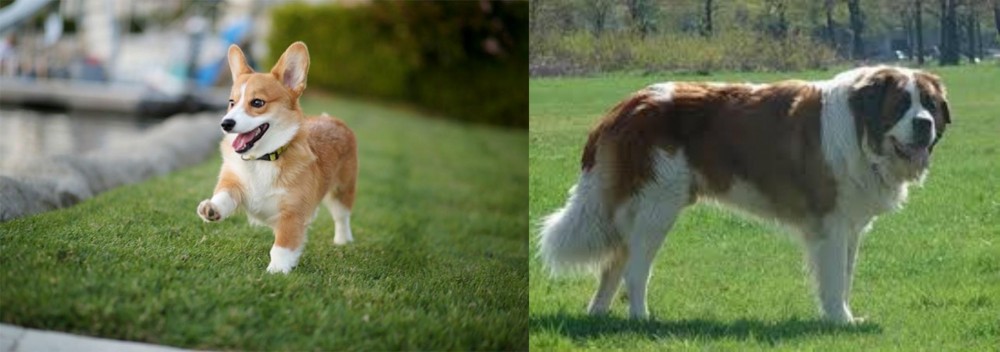 Corgi is originated from United Kingdom but Moscow Watchdog is originated from Russia. Corgi may grow 39 cm / 15 inches shorter than Moscow Watchdog. Corgi may weigh 54 kg / 119 pounds lesser than Moscow Watchdog. Corgi may live 3 years more than Moscow Watchdog. Both Corgi and Moscow Watchdog has almost same litter size. Corgi requires Low Maintenance. But Moscow Watchdog requires Moderate Maintenance
Corgi is originated from United Kingdom but Moscow Watchdog is originated from Russia. Corgi may grow 39 cm / 15 inches shorter than Moscow Watchdog. Corgi may weigh 54 kg / 119 pounds lesser than Moscow Watchdog. Corgi may live 3 years more than Moscow Watchdog. Both Corgi and Moscow Watchdog has almost same litter size. Corgi requires Low Maintenance. But Moscow Watchdog requires Moderate Maintenance
 Known as a cattle herding dog breed, the Corgi hails from Pembrokeshire, Wales. You get 2 breeds – the Cardigan Welsh Corgi and the Welsh Corgi.
Known as a cattle herding dog breed, the Corgi hails from Pembrokeshire, Wales. You get 2 breeds – the Cardigan Welsh Corgi and the Welsh Corgi.
The word ‘Korgi’ actually means ‘dwarf dog’. According to some, the small dog’s history goes back as far as 1107AD, but when you start doing research, you find that the Pembroke Welsh Corgi doesn’t have a traceable breed history.
The Pembrokeshire Corgi was officially recognized by the Kennel Club in the United Kingdom in 1934 and is a breed separate from the Cardiganshire Corgi.
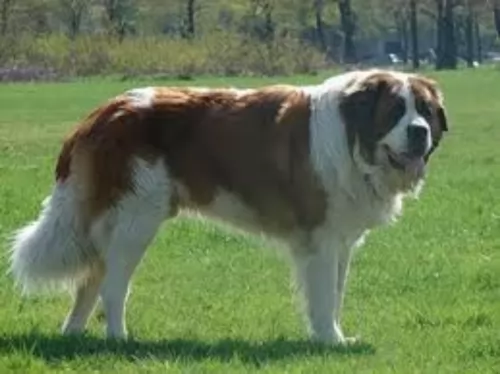 The Moscow Watchdog is a cross between the Caucasian Oytcharka, the St. Bernard and other Russian hound dogs. This large breed dog was developed in the Soviet Union for the purpose of being guard dogs. It had the awareness and assertiveness of the Oytcharka and the size, intelligence and attractiveness of the St. Bernard. The breed is common in Russia today but hardly seen anywhere else even though they were exported to the United States and Europe. The breed had the first U.S. born litter in 2015 and it is not AKC recognized.
The Moscow Watchdog is a cross between the Caucasian Oytcharka, the St. Bernard and other Russian hound dogs. This large breed dog was developed in the Soviet Union for the purpose of being guard dogs. It had the awareness and assertiveness of the Oytcharka and the size, intelligence and attractiveness of the St. Bernard. The breed is common in Russia today but hardly seen anywhere else even though they were exported to the United States and Europe. The breed had the first U.S. born litter in 2015 and it is not AKC recognized.
Following the second world war crime was on the rise in the Soviet Union and a new breed of dog was needed to counter this trend. The dog had to be adaptable to very cold temperatures, snowy weather and have a guard dog personality and ability. The breed was called on to guard such locations as railroads, government offices, warehouses, infrastructure and labor camps.
The project to develop this breed was led by General Medvedev beginning in 1946 at the Central School of Military Kynology – which was a department of the Soviet Ministry of Defense. It took many years to develop the Moscow Watchdog which then became a very successful breed.
It took until 1985 for the breed to be “officially” recognized in the Soviet Union and until 1992 to be recognized by the Federation of Dog Breeders in Russia and until 1997 for the standard to be approved by the Russian Kennel Club. They are still working with the FCI to gain international recognition for the breed. At the moment they are considered a part of the Molosser group and shown in the “Special Show” in Russia.
Committed breeders brought the Moscow Watchdog to Hungary in 1986 in order to make the breed more popular. In addition to this there were many breeders from previous Soviet States that wanted to preserve the breed as well. There were about 500 Moscow Watchdogs in Hungary around then. Currently there are about 27 Moscow Watchdogs in the United States. The breed is known to be a gentle giant and very much a family dog these days.
 The Corgi is a small to medium sized dog, standing at 25 to 30cm and weighs between 10 to 14kg.
The Corgi is a small to medium sized dog, standing at 25 to 30cm and weighs between 10 to 14kg.
The coat of the Corgi is fairly short to medium length and is thick. You’ll find him to be available in colors such as red, fawn, black and tan and with white markings.
He has a sharp, intelligent face with an amicable expression. Looking much like a fox with short legs, he has a long, low-set body body and is a sturdy dog. His ears also stand erect and he has a docked tail.
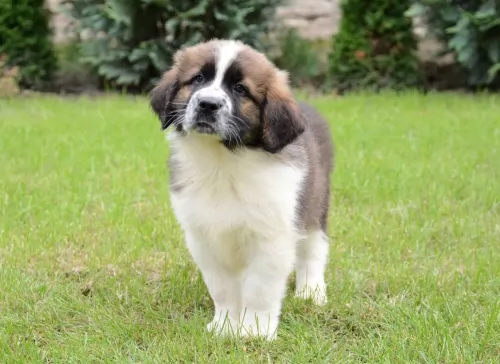 The Moscow Watchdog is related to the mountain dogs and is a very large breed. They are sturdy, muscular and powerful. They have big heads and a thick double coat that sheds profusely four times a year. They have a long tail, an arched chest and an air of confidence.
The Moscow Watchdog is related to the mountain dogs and is a very large breed. They are sturdy, muscular and powerful. They have big heads and a thick double coat that sheds profusely four times a year. They have a long tail, an arched chest and an air of confidence.
He is in the Mastiff family and is smart and trainable. He is not clumsy but has big bones. He is surprisingly agile and active for a dog his size. Unlike the St. Bernard he is not a couch potato. He is also differentiated from the St. Bernard because he does not drool.
These dogs are large but they’ve got a gentle temperament and are good with kids, being playful and energetic with them.
Even though he is a docile dog, you want him trained and socialized, and then he gets along well with other pets too. His sheer size makes it that it is best to supervise him when he’s around small children. He is also a protective dog breed, willing to bond closely to, and protect his human family.
 The sweet little Corgi is well known with his association with Britain’s Queen Elizabeth who has always loved these dogs with their long bodies and short legs. But while the Corgi may well be associated with royalty, he isn’t too snooty by any means to be your pet.
The sweet little Corgi is well known with his association with Britain’s Queen Elizabeth who has always loved these dogs with their long bodies and short legs. But while the Corgi may well be associated with royalty, he isn’t too snooty by any means to be your pet.
He has got a wonderful personality, and he is just waiting to be allowed into your household where he will prove to be a loving, devoted companion and friend.
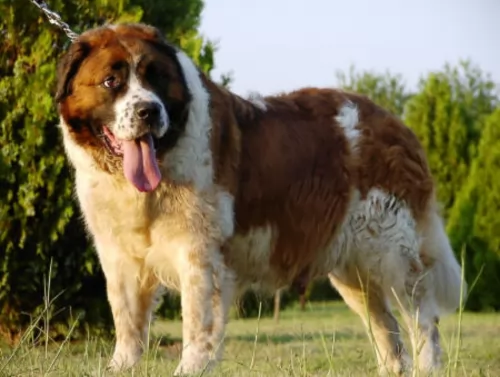 This is a large dog who likes to be involved and busy, even though he is so big. He isn’t suited to city life and being confined to a tiny garden as he needs space.
This is a large dog who likes to be involved and busy, even though he is so big. He isn’t suited to city life and being confined to a tiny garden as he needs space.
They’re independent dogs too and you can leave them alone during the day. He is social, so while you can leave them during the day while you’re at work, he’ll want your attention when you get back. They're such loving, loyal family pets that you owe it to him to make this gentle giant of a dog as happy as can be.
 A corgi, when he is well looked after, can live to be anything from 12 to 15 years of age. However even this sturdy dog may well be susceptible to some of the more common dog illnesses, such as hip dysplasia and degenerative myelopathy.
A corgi, when he is well looked after, can live to be anything from 12 to 15 years of age. However even this sturdy dog may well be susceptible to some of the more common dog illnesses, such as hip dysplasia and degenerative myelopathy.
Also you have to be careful with your Corgi and make sure that he doesn’t gain weight as this weight gain can bring with it a host of health complications.
Hip dysplasia with your Corgi is about an abnormal joint structure where the bones lose contact with each other. This parting of the bones is known as subluxation, and it is this subluxation that can cause your pet pain and discomfort and lead to osteoarthritis.
This disease isn’t reserved for old dogs either, and some young dogs can begin to show signs of this disease before they reach their first birthday. Without taking your dog to the vet and having medical intervention, your pet may eventually be unable to walk.
It is so sad when Degenerative Myelopathy invades your pet as it is a devastating disease watching your pet become paralyzed. The disease seems to come on when then dog is between 8 and 14 years of age where your pet loses co-ordination in the hind limbs, getting worse until he can no longer walk. Often your dog can no longer control his urine output.
There are no real treatments that have stopped the progression of the disease and your vet may suggest treatments that can make your pet more comfortable You vet may compassionately suggest your dog be put down, particularly for those people who can’t afford treatment.
 Moscow Watchdog is looked upon as a fairly healthy dog breed but there are some risks such as hip dysplasia as well as some other large breed problems.
Moscow Watchdog is looked upon as a fairly healthy dog breed but there are some risks such as hip dysplasia as well as some other large breed problems.
With big dogs like this, hip dysplasia is a threat. Its an hereditary condition where the parent dogs pass down the problematic genes. Hip dysplasia results in inflammation and pain for your pet, and where once he loved to play, he is reluctant to and battles to get up after lying down.
 The Corgi isn’t a particularly heavy shedder, so a brush down twice a week will be excellent for his thick coat. And of coarse he will thrive on the attention given to him during the brushing session.
The Corgi isn’t a particularly heavy shedder, so a brush down twice a week will be excellent for his thick coat. And of coarse he will thrive on the attention given to him during the brushing session.
Corgis love walks and sniffing around as they go along. They’re energetic dogs so you’ll need to include him in your daily walks which he just loves, and include him in some ball games.
Corgis may be short in stature but they are robust dogs – sturdily built. They are active dogs and can use up a lot of calories. They will certainly require a diet that features good quality protein.
Feed your Corgi a good quality food designed for special life stages – puppy, adult, pregnant female, senior dog and also dogs with illnesses.
Most Corgis do well having 2 meals of kibble a day. Puppies usually eat 4 meals a day until they are old enough to move onto an adult feeding schedule. Include cooked rice, meat and vegetables in his diet as well as raw meat from time to time and ensure there is always a bowl of clean, cool water available.
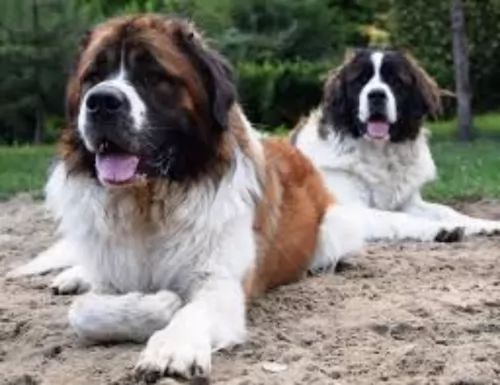 The Moscow Watchdog is a giant sized dog and will require a lot of regular exercise, and apart from a fairly brisk daily walk, will also need games and a run in the park.
The Moscow Watchdog is a giant sized dog and will require a lot of regular exercise, and apart from a fairly brisk daily walk, will also need games and a run in the park.
As a large dog requiring a regular dose of physical exercise as well as mental stimulation, he is better suited to life in the country or at least where there is a large garden.
The Moscow Watchdog has a medium length coat, and as a moderate shedder, you will need to simply brush his coat twice a week to remove loose hair. There is no professional grooming required for these dogs.
Homemade food is always a treat for a dog, but if you’re feeding your Moscow Watchdog commercially manufactured food because of the sheer convenience it provides, make sure the packaging says 'large- or giant dog breed' food. This way you know your pet is getting the right amount of minerals and vitamins for his size.
Always buy the best quality food to avoid giving your pet an overdose of colorants and preservatives. Try and give your pet some home-made food such as boiled chicken, some brown rice or pasta and some cooked vegetables such as sweet potatoes, carrots and spinach. These can be added to his kibble every now and again.
A simple diet like this agrees with your pet and he will be healthy and happy with his lot.